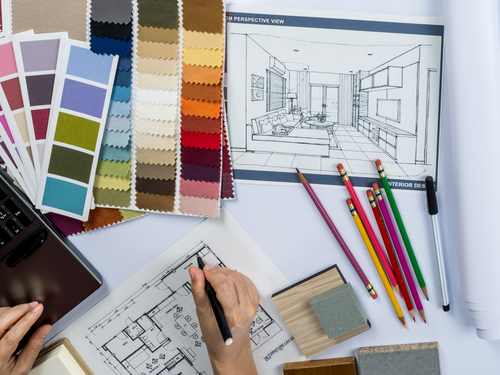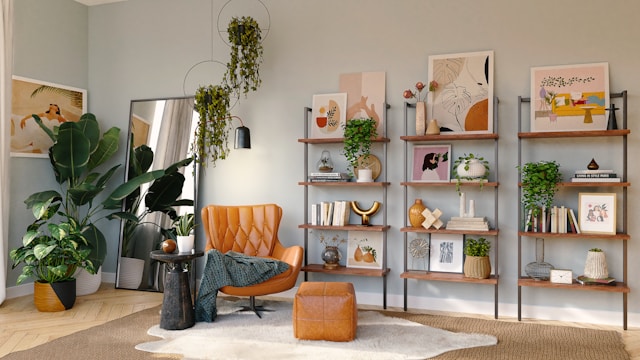The renovation of private or commercial spaces can be both exciting and daunting at the same time. Renovations involve mess, disruption, inconvenience, patience and an ongoing vision of the final result. It is this vision that will carry you through the more worrying aspects of any renovation. It has to be said, though, that renovations are more than just cosmetic updates; they’re a chance to transform your space, improve functionality, and enhance the value of your property. It makes no difference whether you are updating a single room, or a complete renovation of a property, careful planning and thoughtful execution are key to achieving a successful outcome. Renovations are aimed at upgrading the value of a property whilst enhancing its functionality and completely transforming its appeal by modernising and opening up spaces which no longer fully serve their purpose.

For this article, I will concentrate on home renovation rather than that of commercial spaces, as these are both areas worthy of their individual insights. For larger projects, it is necessary to call in different specialists, including architects, builders, carpenters, bricklayers, and possibly demolition specialists to remove existing walls, structures, floors or fittings, whereas minor improvements can be accomplished with a smaller team of outside contractors.
Why Renovate Your Home?
Home renovations are undertaken for a variety of reasons. Two areas which are top of the list for renovation in older homes are kitchens and bathrooms. Kitchens may be completely redesigned to incorporate the space into the general living and dining area, creating a sense of flow and spaciousness, and making the area feel larger and more connected. This will often include the installation of built-in gas stoves and hobs which are quicker, more efficient, and decrease electricity costs. Gas water heaters may also be installed to feed both bathrooms and kitchens to decrease the dependency on electrical power. In such cases, it will be necessary to call in home renovation plumbers to connect and install such appliances.
Home renovations are the first step in making your home more functional as your family’s needs change over time. It could be a simple matter of installing temporary walls in large rooms to break up the space into separate rooms, for instance, turning a large bedroom into two smaller rooms for teenagers who want their own private spaces or creating a home office or study area for those who have converted to home- or self-employment status to avoid the office politics, traffic and time-wasting commuting to and from a centralised office.
Other considerations guiding renovations include:
- Improved Functionality and Comfort: Renovations allow you to tailor your living space to better suit your needs and lifestyle. Whether it’s adding more storage, creating an open-plan layout, breaking up large spaces into more functional areas, or updating outdated areas, renovations can make your home more comfortable and enjoyable.
- Enhanced Property Value: Strategic home improvements, such as kitchen and bathroom upgrades, can significantly boost your property’s market value. This makes renovation projects a smart investment, especially if you’re planning to sell soon. The improvement, particularly if carried out thoughtfully and in neutral tones, will add more value in real terms than the cost of the renovation itself. Buyers are not generally keen on buying a home which will need significant renovation in the short term, thus increasing their costs and general disruption.
- Increased Energy Efficiency: Upgrading your home with energy-efficient windows, superior insulation, and modern lighting can lower utility costs while creating a more sustainable, comfortable and enjoyable living space. Energy-efficient renovations typically provide a higher return on investment.
- Addressing Wear and Tear: Even the best-built homes will show signs of ageing over time. Renovations offer the opportunity to address issues like leaking roofs, damaged flooring, or outdated plumbing, thereby preventing small problems from escalating into costly repairs.
- Aesthetic Appeal: Refreshing the look of your home can be as simple as updating finishes, colours, and décor, possibly undertaken under the guidance of an interior designer. A thoughtful and carefully designed renovation boosts your home’s appearance and enhances your individual style.
- Extension of living areas: Living areas can be converted into inside/outside entertainment areas by the addition of multi-fold, sliding, or French doors which allow the space to be opened up when necessary for larger gatherings. It is also worth considering the addition of features like extensions to patio areas, outdoor kitchens, pergolas, or fire pits for added appeal and functionality.
Key Considerations for a Successful Renovation
Embarking on a renovation project requires thoughtful consideration and planning. Keep the following factors in mind to ensure a smooth and successful process:
- Define Your Goals
Before you begin, be sure what you want to achieve. What are the reasons for the renovation and how long do you plan on remaining in the house? Having a clear goal will guide your decisions throughout the project. Thoughtful planning now can save you from having to renovate again in the future. - Establish a Detailed Plan and Budget
A well-defined plan should include everything from design choices and material selections to a timeline and budget. Working with an architect can help you create a comprehensive plan that minimizes disruptions. If possible, allow for a 10-15% additional spend margin (contingency fund) to cover unexpected problems, unavailability of preferred materials, and workflow interruptions caused by poor weather and supply chain delays or other unplanned delays. - Keep in Mind the Present Structure and Layout
Some renovations may require structural changes, such as removing walls or revising plumbing and electrical systems. It’s crucial to assess whether these changes are realistic and achievable when considering your budget and the building’s existing layout. - Hire Qualified Professionals
Choosing the right professionals is crucial to the success of your renovation. Look for experienced, knowledgeable and skilled contractors with strong portfolios and positive references. A good contractor will communicate effectively, provide a clear contract with timelines and cost estimates, and complete the work to high standards which are essential for the longevity of the renovation and the property as a whole. Professional contractors will be familiar with the municipal and national laws and regulations and assist in obtaining any necessary permits before the work begins, thereby avoiding possible breaches of the law during the renovation process. - Focus on Quality
When choosing materials and fittings, prioritise quality over cheaper options if possible. Whilst high-quality materials may cost more, they offer greater durability and aesthetic appeal, making them a better investment than cheaper options. - Allow for Disruption and Inconvenience
Whether the renovation is minor or a more ambitious and encompassing project, allow for the fact that the process will be disruptive and inconvenient, particularly if you intend to live in the house during the renovation. You will be affected most during kitchen and bathroom renovations, and it would therefore be wise to have alternative plans in place for cooking and bathing needs. Ensure that your contractor/s communicates regularly on progress in the work, together with updated timelines.
Conclusion
Home renovations offer a rewarding way to enhance your living space, boost functionality, and increase property value. With careful planning, a clear vision, and working with the right professionals, you can transform your home into a space that perfectly suits your needs and reflects your personal style. Whether updating a single room or embarking on a major remodel, a successful renovation will not only improve your home’s aesthetics but also create a space your family can enjoy for years to come.

